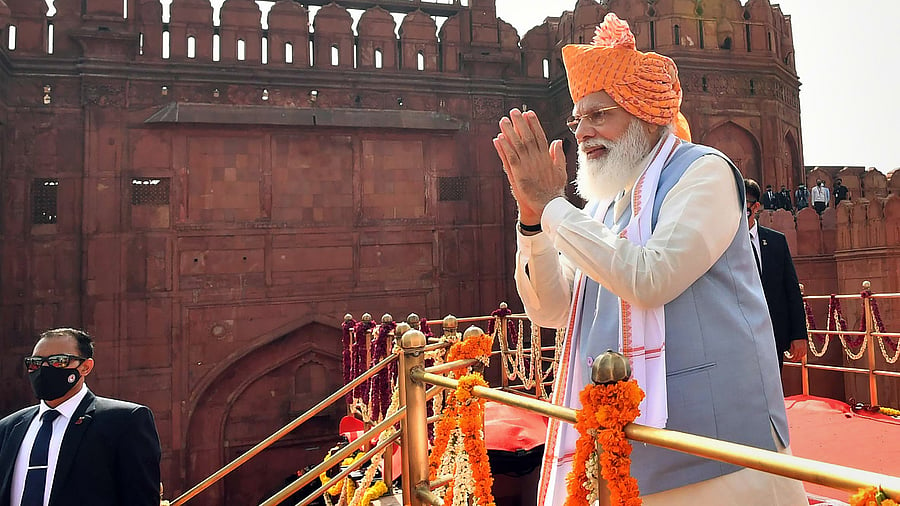
India is responding to the twin threat of terrorism and expansionism strongly, but in a restrained manner, Prime Minister Narendra Modi said on Sunday, tacitly referring to the challenges posed by Pakistan and China to the security and sovereignty of the nation.
“Today the world is looking at India from a new perspective. There are two important aspects of this perception – one is terrorism and the other is expansionism. India is fighting both these challenges and is also responding strongly in a restrained manner,” Prime Minister Narendra Modi said in his speech on the occasion of Independence Day. “Our defence preparedness has to be equally strong if India has to fulfil its obligations properly.”
He was obviously referring to the responses by the Indian Army and the paramilitary forces against cross-border terrorism exported from Pakistan from across the Line of Control (LoC), but also to counter the move by the Chinese People’s Liberation Army (PLA) to unilaterally alter the status quo along the Line of Actual Control (LAC).
“India has also given the message of the might of New India to the enemies of the country by carrying out surgical and airstrikes.” the Prime Minister said, referring to the Indian Army’s raid on a terror camp across India’s LoC with Pakistan in September 2016 as well as the bombing by the Indian Air Force in another terrorist training camp deep inside Pakistan in February 2019. “It shows that India is changing. India can change. India can take the toughest decisions and it does not hesitate and stop in taking even the toughest decisions.”
The nation celebrated its 75th Independence Day even as the more-than-16-month-long stand-off between the Indian Army and the Chinese PLA in eastern Ladakh could not be completely resolved yet. Though long-drawn negotiations resulted in mutual withdrawal of troops from both the banks of Pangong Tso (lake) in February and from Gogra Post this month, the two sides could not yet agree to pull back soldiers from several other face-off points, including Hot Springs, Demchok and Depsang Plains.
The Indian Army and the Pakistan Army on February 25 this year agreed to strictly adhere to the 2003 ceasefire pact and avoid firing at each other across the LoC or the undisputed stretches of the border between the two nations. This de-escalated tension along the LoC and fuelled speculation about back-channel talks leading to a thaw. The two sides, however, of late restarted to war of words, with New Delhi blaming Prime Minister Imran Khan’s government and Pakistan Army for exporting terror to India and Islamabad blaming spy agencies of India for terrorist attacks in Pakistan.
“I assure the country that we will leave no stone unturned to strengthen the hands of our forces engaged in the defence of the country,” the Prime Minister said on Sunday.
India is also worried over the possibility of Pakistan gaining a “strategic edge” in Afghanistan after the resurgence of the Taliban following the withdrawal of troops by the United States and its NATO allies.
The Taliban in the past extended support to anti-India terrorists based in Pakistan, including during the hijacking of an Indian Airlines aircraft in December 1999.
Modi on Sunday also highlighted his government’s push for raising India’s self-reliance in the defence sector, particularly in manufacturing military hardware. “We are making constant efforts to provide new opportunities to our hard-working entrepreneurs and to encourage Indian companies to make the country self-reliant in the field of defence,” the Prime Minister said.
Check out DH's latest videos:

